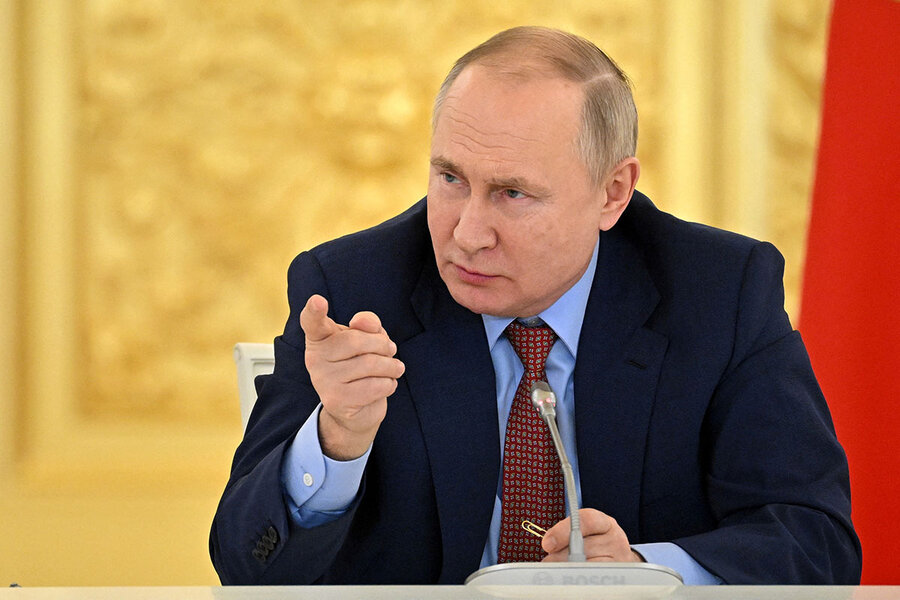The Russian public doesn’t want war, but is anyone listening?
Loading...
| Moscow
Eight years ago, following Russia’s annexation of Crimea, the Kremlin’s confrontational policies brought out tens of thousands of peace marchers to the streets of Moscow, even as polls showed huge majorities of the public enthusiastically in favor of President Vladimir Putin’s defiance of the West.
Today, amid the Kremlin’s standoff with NATO over Ukraine, the mood is very different for both peace advocates and the public.
Russia’s beleaguered liberal intelligentsia are still speaking out in a tough statement signed by over 5,000 people, warning that in the current crisis “the citizens of Russia are becoming hostages to criminal adventurism,” and urging authorities to step back from the brink of war. The petition is signed by hundreds of rights activists, artists, filmmakers, musicians, journalists, scientists, and opposition politicians.
Why We Wrote This
There seems to be little appetite for a war with Ukraine or NATO among Russians, be they peace activists or members of the general public. But many feel the choice for war isn’t theirs to shape.
In the past, such a political challenge would have inspired open protests by like-minded members of the public, and at least be widely noticed in the Western media. But the anti-war petition, published on the website of the Ekho Moskvy radio station, appears to have garnered almost no attention.
Meanwhile, opinion polls and focus groups conducted by Russia’s only independent public opinion agency, the Levada Center, show that while majorities support the Kremlin and blame the West for the gathering war clouds, there is no appetite for a conflict in Ukraine, only pervasive fear and a sense of inevitability.
“The overwhelming mood today is despondency,” says Masha Lipman, senior associate at the PONARS Eurasia program at George Washington University. “This talk of war is something people hear about on the daily news. They are not unaware of it, and much of the public accepts the Kremlin narrative. But unlike the past, when people rejoiced at the annexation of Crimea, the mood now is very sour.”
“Russian public opinion is not a constraint”
A December survey by the Levada Center found that half of Russians believe the U.S. and NATO are to blame for the conflict in Ukraine, while 16% fault Ukraine and just 4% think Russia is responsible. In the same poll, 56% of Russians said they fear a big war could break out between Russia and NATO, slightly down from the 62% who feared a new world war a year ago.
Yet just two years ago, in another Levada poll, almost 80% of Russians said relations with the West should be defined by bonds of friendship, while 16% described the West as a rival, and just 3% as an enemy.
“It seems that, although society is afraid of war, people are internally prepared for it,” Denis Volkov, director of the Levada Center, said in a Radio Liberty discussion of focus groups with Russians about the crisis. “What people say most frequently is, ‘We don’t want war. We are scared of it, but it keeps coming closer and closer. We are being dragged into a war against our will.’”
“Russian public opinion is not a constraint for Russian authorities. It is taken into consideration, but it doesn’t restrain them,” he added.
For signatories to the anti-war statement, there is also a weary sense of hopelessness. Over the past year, as war fever has spiked, Russian authorities have cracked down on all manner of dissent, jailing anti-corruption activist Alexei Navalny, shuttering human rights groups, marginalizing independent media, and even suppressing permitted opposition organizations like the Communist Party.
“We are gathering signatures, and we’re lucky that Ekho Moskvy will publish” the statement, says Leonid Gozman, president of the Union of Right Forces, an opposition nongovernmental organization. “The state blocks our voice, and even if we get mentioned, there is no chance for us to speak. There is no dialog. ... I haven’t been arrested yet, but the risk is definitely there. I only do this to preserve my self-respect.”
Boris Vishnevsky, a member of the St. Petersburg legislature with the liberal Yabloko party, says that even independent Russian media has paid scant heed to their appeal for peace.
“The nonstop message in the media is that Putin is always right and NATO wants to attack Russia,” he says. “A lot of people in the mass media don’t seem to believe that the danger of war is real, or perhaps they just don’t think they can do anything about it. Everything depends on the mood of our leader.”
Liberation of Ukraine?
The Kremlin has consistently denied any intention to invade Ukraine, and insists all talk of Russian war preparations is a NATO fabrication.
But Sergei Markov, a former Putin adviser who often reflects the views of Russia’s security hard-liners, says that war is indeed coming.
“It will not be a war against Ukraine, but to liberate Ukraine” from the grip of the pro-Western government that took power after a street revolt in 2014, he says. “A military operation now would prevent a wider war in future. ... As for this small group of pro-Western [signatories of the anti-war petition], they are not liberal. They are a group of traitors.”
The strange ambiguity of the current Russian public mood would be deeply shaken should war actually erupt, says Ms. Lipman.
“It’s odd that Putin’s approval ratings haven’t been affected one way or another during the course of this crisis,” she says. “But if an actual war, with violence and real pain, should happen – God forbid – this complicated moment will be gone, and everything will change.”







